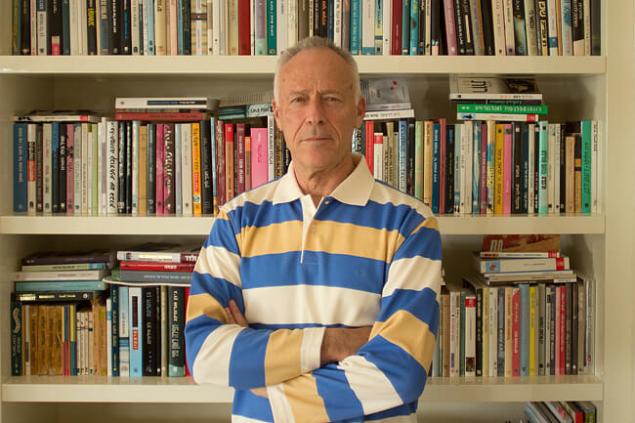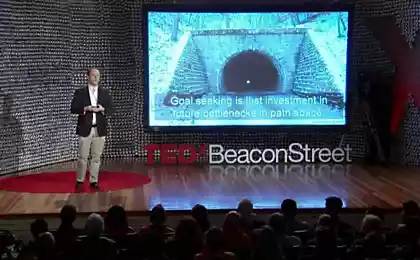540
Jacob Burak: Intellectual humility
The founder of the digital magazine Alaxon Jacob Burak about how technology reinforces our illusion of wisdom and omnipotence, and sleek design apps and websites are working against us, and why in times of universal confidence is increasingly valued intellectual modesty, which is based on the pursuit of truth and readiness for the new.

"If I had a little humility I would be perfect," he said in a moment of euphoric narcissistic media Mogul Ted Turner somewhere in the 90-ies. But Ted Turner has since become more modest, and today's galaxy of tech entrepreneurs often demonstrates the same arrogance.
Why shy? In the end, Aristotle said: "All men by nature seek knowledge". Since we are more down to earth look at things and continue to ignore the limitations of our knowledge, intellectual modesty has become a special case of modesty.
Intellectual humility, intellectual humility — the recognition that we don't know everything, and what we know, we must not use to their advantage. Instead, we must recognize that we are probably wrong in our blind faith in how much we understand and seek the sources of wisdom, which we are lacking today.
The Internet and digital media has created an impression of unlimited knowledge that lies in our hands. But, making us lazy, they opened the space that can fill ignorance. On the website Edge, the psychologist Tania Lombrozo from the University of California explained how technology reinforces our illusion of wisdom.
She argues that the way in which we receive information about the problem is crucial for our understanding and the easier we can revive the memory of an image, a word or utterance, the more likely we will think that we have successfully learned something, and therefore going to refrain from requiring the engagement of cognitive processing.
Logic puzzles presented by unfriendly font, for example, may encourage someone to apply additional effort to solve them. However, this approach is inconsistent with the streamlined designs of apps and websites that populate our screens, where our brain processes the information deceptively "smooth" way.
What about all of the comments and conversations that happen on the Internet? Well, our capacity to learn with their help depends on the relationship with other people. Intellectually humble people do not suppress, hide or ignore their vulnerability, like most trolls. In fact, they see your weaknesses as sources of personal development, and use arguments as an opportunity to clarify their views.
People who are modest by nature, tend to be more open and faster settle disputes, as they recognize that their own opinion may not be the ultimate truth. Psychologist Carol Dweck from Stanford University in California showed that if you believe that intelligence can be developed with a new experience and hard work, you probably put more efforts to solve complex problems compared with those who think that intelligence is hereditary and unchanging.
Intellectual humility is based on the ability to choose the truth and not social status. It is noted first and foremost the desire to find answers and willingness to accept new ideas even if they contradict our views.
Listening to others, we risk to discover that they know more than we do. But modest people are considering personal growth and its development as a goal in itself and not as a means of moving up the social ladder. We skip past a lot of information available if orientirueshsya only ourselves and our place in the world.

At the other end of the scale lies the intellectual arrogance — the evil twin of self-confidence. Such arrogance almost always comes from egocentric bias — the tendency to overestimate our own dignity or importance, not paying attention to the role of chance or influence the actions of other people in our lives. This is what makes us ascribe success to themselves and failure to circumstances.
Of course, the egocentric bias makes sense, as our own personal experience is what we understand best. But this quality becomes a problem when that experience is too superficial to form on its basis a serious opinion, though we still try to do it. Studies have shown that people find it difficult to recognize the gaps in their knowledge, even if they can easily identify them from others.
From an evolutionary point of view, intellectual pride can be seen as a way to achieve domination by imposing its point of view to others. At the same time, the intellectual simplicity makes us to invest mental resources in debate and work towards achieving group consensus.
"Trayv center of human development" (The Thrive Center for Human Development) in California, which aims to help young people become successful adults, has financed several major studies of intellectual modesty. Their hypothesis is that the simplicity, curiosity and openness are key to a full life.
One of their works offers a scale for measuring modesty by ascertaining whether modesty is a constant quality or is the quality depends on the circumstances. Recognition of the fact that our opinions (and other people's opinions) will vary depending on the circumstances, this in itself is an important step towards reducing our exaggerated confidence in the fact that we are right.
If in the field of science necessity is the mother of invention, then modesty would be a father. Scientists must be willing to abandon their theories in favor of new, more precise explanations in order to keep pace with constant innovation. Many scientists who made important discoveries in the early stage of his career, trapped in ego and become unable to make major new discoveries.
In his fascinating blog, the philosopher W. Jay wood (W Jay Wood) argues that an intellectually humble scientists get more of the fruit of knowledge and intuition than those who lack this virtue. As he says, intellectual modesty "it changes scientists themselves in a way that allows them to devote their abilities and activities in a more effective direction."
Albert Einstein knew this when he said that "information is not knowledge". Laszlo Bock, Google Vice President for personnel, agrees. In an interview with The New York Times, he said that modesty is one of the main qualities he looks for in candidates, but it is often hard to find among successful people, because they rarely experience failure.
9 the wise rules of life that will free you from the habit of worry
Joe Vitale: the Practice of GRATITUDE is a strong method that is attractive and pleasant events in life
"Without humility you can't learn, "he notes. Perhaps a bit ironic for a company that has done more than any other to create the illusion that information began to seem instantaneous, seamless, easily accessible. Perhaps, modesty refers to the kind of things that you can only have when you do not know about it.
Author: Jacob Burak
P. S. And remember, only by changing their consumption — together we change the world! ©
Source: monocler.ru/intellektualnaya-skromnost/

"If I had a little humility I would be perfect," he said in a moment of euphoric narcissistic media Mogul Ted Turner somewhere in the 90-ies. But Ted Turner has since become more modest, and today's galaxy of tech entrepreneurs often demonstrates the same arrogance.
Why shy? In the end, Aristotle said: "All men by nature seek knowledge". Since we are more down to earth look at things and continue to ignore the limitations of our knowledge, intellectual modesty has become a special case of modesty.
Intellectual humility, intellectual humility — the recognition that we don't know everything, and what we know, we must not use to their advantage. Instead, we must recognize that we are probably wrong in our blind faith in how much we understand and seek the sources of wisdom, which we are lacking today.
The Internet and digital media has created an impression of unlimited knowledge that lies in our hands. But, making us lazy, they opened the space that can fill ignorance. On the website Edge, the psychologist Tania Lombrozo from the University of California explained how technology reinforces our illusion of wisdom.
She argues that the way in which we receive information about the problem is crucial for our understanding and the easier we can revive the memory of an image, a word or utterance, the more likely we will think that we have successfully learned something, and therefore going to refrain from requiring the engagement of cognitive processing.
Logic puzzles presented by unfriendly font, for example, may encourage someone to apply additional effort to solve them. However, this approach is inconsistent with the streamlined designs of apps and websites that populate our screens, where our brain processes the information deceptively "smooth" way.
What about all of the comments and conversations that happen on the Internet? Well, our capacity to learn with their help depends on the relationship with other people. Intellectually humble people do not suppress, hide or ignore their vulnerability, like most trolls. In fact, they see your weaknesses as sources of personal development, and use arguments as an opportunity to clarify their views.
People who are modest by nature, tend to be more open and faster settle disputes, as they recognize that their own opinion may not be the ultimate truth. Psychologist Carol Dweck from Stanford University in California showed that if you believe that intelligence can be developed with a new experience and hard work, you probably put more efforts to solve complex problems compared with those who think that intelligence is hereditary and unchanging.
Intellectual humility is based on the ability to choose the truth and not social status. It is noted first and foremost the desire to find answers and willingness to accept new ideas even if they contradict our views.
Listening to others, we risk to discover that they know more than we do. But modest people are considering personal growth and its development as a goal in itself and not as a means of moving up the social ladder. We skip past a lot of information available if orientirueshsya only ourselves and our place in the world.

At the other end of the scale lies the intellectual arrogance — the evil twin of self-confidence. Such arrogance almost always comes from egocentric bias — the tendency to overestimate our own dignity or importance, not paying attention to the role of chance or influence the actions of other people in our lives. This is what makes us ascribe success to themselves and failure to circumstances.
Of course, the egocentric bias makes sense, as our own personal experience is what we understand best. But this quality becomes a problem when that experience is too superficial to form on its basis a serious opinion, though we still try to do it. Studies have shown that people find it difficult to recognize the gaps in their knowledge, even if they can easily identify them from others.
From an evolutionary point of view, intellectual pride can be seen as a way to achieve domination by imposing its point of view to others. At the same time, the intellectual simplicity makes us to invest mental resources in debate and work towards achieving group consensus.
"Trayv center of human development" (The Thrive Center for Human Development) in California, which aims to help young people become successful adults, has financed several major studies of intellectual modesty. Their hypothesis is that the simplicity, curiosity and openness are key to a full life.
One of their works offers a scale for measuring modesty by ascertaining whether modesty is a constant quality or is the quality depends on the circumstances. Recognition of the fact that our opinions (and other people's opinions) will vary depending on the circumstances, this in itself is an important step towards reducing our exaggerated confidence in the fact that we are right.
If in the field of science necessity is the mother of invention, then modesty would be a father. Scientists must be willing to abandon their theories in favor of new, more precise explanations in order to keep pace with constant innovation. Many scientists who made important discoveries in the early stage of his career, trapped in ego and become unable to make major new discoveries.
In his fascinating blog, the philosopher W. Jay wood (W Jay Wood) argues that an intellectually humble scientists get more of the fruit of knowledge and intuition than those who lack this virtue. As he says, intellectual modesty "it changes scientists themselves in a way that allows them to devote their abilities and activities in a more effective direction."
Albert Einstein knew this when he said that "information is not knowledge". Laszlo Bock, Google Vice President for personnel, agrees. In an interview with The New York Times, he said that modesty is one of the main qualities he looks for in candidates, but it is often hard to find among successful people, because they rarely experience failure.
9 the wise rules of life that will free you from the habit of worry
Joe Vitale: the Practice of GRATITUDE is a strong method that is attractive and pleasant events in life
"Without humility you can't learn, "he notes. Perhaps a bit ironic for a company that has done more than any other to create the illusion that information began to seem instantaneous, seamless, easily accessible. Perhaps, modesty refers to the kind of things that you can only have when you do not know about it.
Author: Jacob Burak
P. S. And remember, only by changing their consumption — together we change the world! ©
Source: monocler.ru/intellektualnaya-skromnost/
Toyota is considering sozdaniemnovogo fuel cell
The Grand MYTH about the FLU is true of Marva Oganyan























